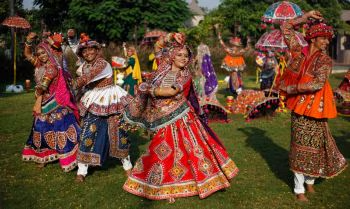Navratri 2025: Celebrating Tradition, Safety, and Inclusive Harmony
Maharashtra: As the ten-day Navratri festival begins on September 22, featuring garba and dandiya events across the state, the Vishwa Hindu Parishad (VHP) has issued guidelines suggesting that organisers restrict participation to Hindus, apply a tilak to verify religious identity, and implement Aadhaar card verification.
These measures are intended to preserve the religious sanctity of the events, which start with the goddess puja and arti and end with worship. The VHP has also cited concerns about alleged incidents of misconduct at previous events.
A Maharashtra VHP spokesperson, Shriraj Nair, stated that their recommendations are consistent with the religious essence of Navratri. He emphasized that events should remain devotional and expressed concern about what they term “Love Jihad”, suggesting that non-Hindus sometimes attend with ulterior motives.
Emphasizing Socio-Cultural Harmony
While Navratri has deep roots in Hindu tradition, India is a pluralistic nation with multiple religions, languages, and cultural practices.
Over the years, festivals like Navratri have evolved into shared cultural experiences, attracting people of diverse backgrounds to participate in dance, music, and communal celebrations.
The Constitution of India guarantees freedom of religion (Article 25) and emphasizes equality, fraternity, and social harmony (Article 15, Preamble). Exclusion based on religion can create social divisions, while inclusive celebrations promote mutual respect, understanding, and communal harmony.
Experts note that Navratri events can preserve traditional rituals—puja, arti, and offerings—without restricting participation based on faith, allowing attendees of all backgrounds to enjoy cultural performances and dance respectfully.
Inclusive celebrations provide a platform for intercultural understanding while safeguarding the festival’s sanctity.
Guide for Safe and Inclusive Garba-Dandiya Celebrations
To balance tradition, safety, and inclusivity, organisers are encouraged to adopt the following measures:
1. Safety and Security:
- Install CCTV cameras and maintain adequate police presence.
- Establish clear codes of conduct for all participants.
- Provide on-site emergency medical facilities.
2. Maintaining Ritual Integrity:
- Begin and end events with goddess puja and arti.
- Ensure participation etiquette is communicated clearly without enforcing religious identity.
3. Inclusive Participation:
- Welcome attendees who respect the festival’s traditions.
- Encourage cultural exchange and interaction among diverse participants.
4. Community Awareness:
- Educate participants about the history, symbolism, and significance of Navratri.
- Promote respectful behavior during dance, music, and communal gatherings.
5. Monitoring Without Exclusion:
- Instead of restricting by religion, focus on behavioral conduct and adherence to event rules.
- Use crowd management and verification measures to ensure safety while maintaining inclusivity.
Festivals as a Tool for Unity
Navratri is more than a religious ritual; it is an expression of shared heritage, community bonding, and collective joy. Inclusive celebrations allow participants from all faiths to respectfully enjoy the music, dance, and cultural performances, strengthening friendship, unity, and bonhomie.
Rather than fostering exclusion, festivals can be celebrated as instruments of harmony, showcasing India’s diversity and reinforcing the constitutional vision of fraternity. By embracing both tradition and inclusivity, Navratri 2025 can become a model for safe, respectful, and joyous communal celebrations.
#Navratri2025 #InclusiveCelebration #UnityInDiversity #CulturalHarmony #CommunityBonding #ReligiousTolerance #IndiaTogether #RespectAllFaiths #FestivalsForUnity #SafeCelebration #Bonhomie #TraditionalAndInclusive #CelebrateTogether




